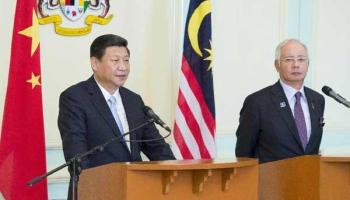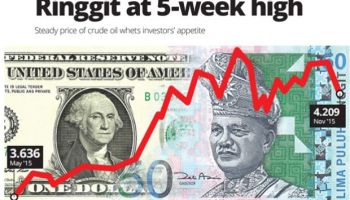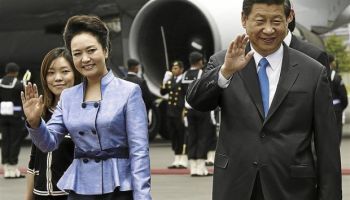 Illuminated boards highlighting Xi’s signature One Belt- One Road foreign policy plan in Beijing. Leaders of 28 countries are set to attend the summit in the Chinese capital next month to discuss the infrastructure investment programme to stitch together the Eurasian continent. — AP
Illuminated boards highlighting Xi’s signature One Belt- One Road foreign policy plan in Beijing. Leaders of 28 countries are set to attend the summit in the Chinese capital next month to discuss the infrastructure investment programme to stitch together the Eurasian continent. — AP 'Win-win development will lie at the core of the forum. The Belt and Road has become the most important public good China has provided to the world. It was first proposed by China, but now it is for all countries to enjoy.' - Wang Yi. 'Belt and Road has the power and prestige of President Xi Jinping behind it. It is the centre of his vision for China, and of his ambition to transform China's place in the world during his time as its leader ... And already it is starting to change the geoeconomic and the geopolical landscape.' - Huge White
'Win-win development will lie at the core of the forum. The Belt and Road has become the most important public good China has provided to the world. It was first proposed by China, but now it is for all countries to enjoy.' - Wang Yi. 'Belt and Road has the power and prestige of President Xi Jinping behind it. It is the centre of his vision for China, and of his ambition to transform China's place in the world during his time as its leader ... And already it is starting to change the geoeconomic and the geopolical landscape.' - Huge White China's Belt-Road plan may top US$500b, Credit Suisse says
China’s ambitious economic plan is set to draw up a new global paradigm with countries seeking to engage the Middle Kingdom.
WHEN the ambitious Belt and Road initiative – with projects reportedly worth US$1 trillion – was first announced by President Xi Jinping in the autumn of 2013, many were sceptical of this Chinese move aimed at building up economic connectivity of 65 nations (China plus 64) along its ancient silk road and maritime routes.
For China, this New Silk Road would also serve to redirect the country’s domestic overcapacity and capital for regional infrastructure development to improve trade and ties with Asean, Central Asian and European countries.
Unprecedented in terms of China’s financial commitment, many Western critics have viewed this strategy as a grandiose foreign policy to expand Beijing’s influence to poor nations hungry for economic and infrastructure development.
The initiative was mooted at a time when the United States and the West excluded China from regional trading blocs. Hence, Beijing’s new development vision has been read as a strategy for asserting its leadership role in Asia and beyond.
But after nearly four years of promoting the concept and implementing projects, this initiative – dubbed as a modern-day Marshall Plan – is gaining traction.
It is seen by some Western academics as posing a threat to the US-centric world trade order and economic model.
Without a doubt, China is heading towards achieving its regional economic and diplomatic objectives. And the internationalisation of the renminbi is being boosted.
“We expect the One Belt-One Road (OBOR) to support long-term growth of development in the economies involved, particularly in some of the least developed parts of the world... We also expect it to help boost China’s global influence,” says a report dated April 27 by Oxford Economics.
While the idea of enhancing connectivity has drawn interest, the worry on China’s potential hegemonic ambitions has prevailed among regional rivals India and Japan, as well as the United States.
Despite this, nations that correctly read China’s economic strategy and Xi’s resolve were quick to announce their support for this China-led inclusiveness. And Malaysia had become one of the earliest participants and is now a gainer.
The Belt and Road initiative is largely assessed as having progressed well despite some setbacks.
Many countries are at ease to engage with China, particularly after Xi declared the “Three Nos”: no interference in the internal affairs of other nations; no intention to increase the so-called “sphere of influence”; and no motive to strive for hegemony.
Recipient nations are enjoying higher economic, trade and business activities, as well as a tourism boom helped by the influx of tourists from China – the world’s second largest economy and biggest consumer market.
The impact of the Chinese strategy is particularly conspicuous in the least developed nations in Africa and West Asia, as well as Asean nations such as Laos, Vietnam, Indonesia, Cambodia and Malaysia.
“Many belt-road countries have for many years been neglected by the West and Western investors, so even though there are concerns, some countries see China as offering once-in-a-lifetime chance to get out of poverty and under-development,” observes Dr Ngeow Chow Bing, deputy director of Institute of China Studies, Universiti Malaya.
China says it has invested more than US$50bil (RM220bil) on belt-road projects over the past three years, and signed project contracts worth US$926bil (RM4.16 trillion) covering mainly railway networks, highways and ports.
But China and its construction companies have also benefited from these endeavours. Its economy has been stimulated by exports from industries with overcapacity such as steel, cement and aluminium. Its GDP growth of 6.9% in the first quarter of 2017 was higher than expected.
Significantly, China’s state-owned construction conglomerates have successfully ventured out into belt-road nations. With these giants leading the build-transfer-operate schemes, smaller private enterprises have followed suit.
With China’s infrastructure projects and industrial investments extended to over 60 nations, the belt-road strategy is challenging the US-led world order and a new economic paradigm is definitely emerging, according to analysts.
Teoh: ‘OBOR will reshape the world’s economic dynamics
“OBOR will significantly reshape the world’s economic dynamics. It will sharply increase accessibility and trades, across over 65% of the world’s population and 25% of global trade and services,” says Teoh Kok Lin, founder and chief investment officer of Singular Asset Management, a Kuala Lumpur-based regional asset investment company.
“Emerging economies, in particular, will benefit most from the increased global trades and services as well as improved infrastructure. OBOR will expand trade globalisation at a time when the world is worried about the Trump administration push towards the Buy America policy,” adds Teoh.
Closer economic relations with Beijing has helped reduce regional tension and friction, as seen in the case of the South China Sea where the Philippines under its current president saw economic cooperation with China as more practical.
Despite concerns over China’s rapid reclamation of reefs in South China Sea, in which Manila and several Asean nations have contesting territorial claims with China, the Asean Summit is unlikely to kick up a storm.
According to Reuters, Philippine President Rodrigo Duterte said on Thursday “it is pointless” discussing Beijing’s contentious activities in the South China Sea at this summit, and “no one dared to pressure China anyway.”
Referring to the Belt and Road initiative as “a brilliant plan”, CLSA in its report remarks: “Xi Jinping’s ambitious strategic initiative – an adaptation of the historical Silk Road – marks the beginning of a new geopolitical era.”
May 14-15 summit and forum
The major achievements of the belt and road initiative are expected to be further highlighted at the coming two-day Belt and Road Forum for International Cooperation, which will be opened by President Xi on May 14 in Beijing.
This summit could be the most important diplomatic event this year to discuss what is expected to be the largest global economic programme.
“Amid challenges and the perceived fear of China’s influence of regional geopolitical landscape, China’s OBOR initiative has achieved commendable progress since 2013,” says Datuk Ter Leong Yap, president of the Associated Chinese Chamber of Commerce and Industry of Malaysia.
“China has made significant headway by kick-starting infrastructure and connectivity projects to facilitate trade and investment, promote financial cooperation as well as deepening cross border flow,” he adds.
Since 2013, China’s businessmen have built 56 economic and trade cooperation zones in belt-road countries, generating nearly US$1.1bil (RM4.7bil) in tax revenue and creating 180,000 jobs, according to Xinhua.
Large-scale infrastructure projects – along with funding – have led to a boom of economic activity in countries like Kazakhstan, Azerbaijan, Georgia, Belarus, and Poland.
And in Asean, rail and ports projects are either being constructed or planned. These include the China-Laos Railway, Jakarta–Bandung High Speed Rail, Malaysia’s East Coast Rail Link and a high-speed rail project in Thailand.
And Eurasia, the vast landmass from China to Europe, is being interconnected into a massive market via high-speed China-Europe, trans-Eurasian direct trains.
These modern freight rail systems, which have replaced the silk-laden camels of the Han Dynasty, could transport goods at lower costs and more efficiently from China to European cities (and vise versa), compared to shipping.
In sum, China’s overland belt-road projects have achieved the objective of building a trans-national network connecting Asia with Europe and Africa, and promoting economic development in participating countries.
And it looks like the current objective and scope will be widened to embrace nations outside the belt-road routes.
“China is upbeat about the initiative in boosting mutual development and is willing to channel more energy into it,” declared Chinese Foreign Minister Wang Yi on April 21, when he briefed the media on the coming summit and forum.
“Win-win development will lie at the core of the forum. The Belt and Road has become the most important public good China has provided to the world. It was first proposed by China, but now it is for all countries to enjoy,” Wang said.
A total of 28 heads of state and government – including Russian President Vladimir Putin, Turkish President Recep Tayyip Erdogan and Malaysian Prime Minister Datuk Seri Najib Tun Razak – have confirmed they will be attending the May 15 summit.
UN secretary-general Antonio Guterres, World Bank president Jim Yong Kim and International Monetary Fund managing director Christine Lagarde will also be present.
Over 80 leaders from international organisations, 100 ministerial-level officials, as well as 1,200 delegates from various countries will be there, too.
President Xi will deliver a keynote speech, as well as host a roundtable meeting to brainstorm on policy and strategic development and interconnected development in the world.
There will be another high-level meeting to discuss infrastructure, trade and economic cooperation, energy resources, financial cooperation, eco-environment, and people-to-people exchanges.
According to Wang, China expects to sign agreements with around 20 countries and 20 organisations at the event to turn the grand blueprint into a workable road map, and to push for the delivery of joint projects under earlier MOUs.
He clarified that China has no intention of drawing geographical boundaries to areas covered by the initiative.
“As long as the spirit of the Belt and Road is recognised... everyone can enjoy its opportunities,” he said.
Japan sprang a surprise last week when Toshihiro Nikai, the secretary-general of the ruling Liberal Democratic Party, said he would attend the New Silk Road summit.
“Given the international situation starting with North Korea, mutual understanding between Japan and China is vital,” he was quoted by Jiji News Agency as saying.
What lies ahead in 2017?
Over the past two years, China had generated huge momentum for its New Silk Road initiative by signing many MOUs on infrastructure projects with belt-road countries.
Chinese firms, mainly state-owned or controlled, had reportedly signed investment deals worth US$171bil (RM742bil). Among these was the US$46bil (RM200bil) China-Pakistan economic corridor.
The government of Xi is expected to start making good on these projects this year and help facilitate their financing and implementation.
Nearer home, the financing and construction of Malaysia’s RM55bil East Coast Rail Link is expected to start this year. The rail project is set to spur economic activities in the east coast states of the peninsula.
Wake Shepard, a China watcher and writer, expects increased economic participation from Europe.
“Beyond the further development of key trans-Eurasian logistics hubs on the Poland/Belarus border and a port in Greece, look for more high-end European products going overland by rail to China,” he wrote on Forbes.com.
Many Europe-based logistics giants have been promoting Europe-China rail transport in 2016, and in 2017 they should see results from these efforts, he added.
“European freight forwarders, manufacturers and policy makers are now waking up to the fact that these newly enhanced trade corridors are providing ample opportunity to get more of their high-value products to the booming markets of China and the rest of Asia,” says Shepard.
For China, the forum may be a good platform for it to listen to views on why some ventures did not progress well, such as its port-city investment in Sri Lanka.
Complaints that Chinese firms have posed unhealthy competition and threaten to wipe out small businesses of belt-road countries could also be on the table for deliberation.
The Middle Kingdom may also have to assess whether it is worthwhile to take risks in countries clouded by security issues, political instability and racial conflicts.
Belt road implications
The importance China has attached to the Belt and Road summit and forum goes to show how vital this international economic inclusive programme is to China and Xi.
It is imperative for Xi, who took over the presidency in late 2012, to show his ability to transform China into a global, influential leader.
After three decades of rapid growth, China needs to seek new investment and trade opportunities beyond its borders and the belt-road initiative mooted by Xi is addressing this predicament.
The infrastructure projects China build in belt-road countries will help absorb a significant portion of the country’s overcapacity, and counter its economic slowdown.
As western China has often been troubled by tension between the financially-weak Uighur Muslims and China’s Han majority in Xinjiang Province, economic development in this old silk road region may pacify the Uighurs and reduce ethnic conflicts.
But Hugh White, professor of strategic studies at the Australian National University in Canberra, sees China as having much bigger ambitions.
“China wants to consolidate its position at the centre of the global supply and manufacturing networks which will be the key to the global economy over the coming decades,” he wrote in a recent comment.
The initiative will also help China to realise its ambition to become a middle-income country and reinforce its parallel ambition to take the lead over the coming decades in developing key technologies and setting global standards – including for high-speed rail and data networks, he added.
He opined the Belt and Road Initiative could not be dismissed as a mere dream.
“It has the power and prestige of President Xi Jinping behind it. It is at the centre of his vision for China, and of his ambition to transform China’s place in the world during his time as its leader. And already it is starting to change the geo-economic and geopolitical landscape.”
“If America and its allies are determined to resist China’s challenge to the old US-led liberal global order, they have to counter Beijing’s powerful vision. And to do that they need an equally powerful and ambitious global economic vision.”
Source: by Ho Wah Foon The Star/ANN
Related story:
Financing of OBOR projects
One Belt One Road
https://youtu.be/2gWUhpXU3cA
Related posts:


























 Going green By Wang Xiaoying
Going green By Wang Xiaoying Carbon commitment Illustration: Shen Lan/GT
Carbon commitment Illustration: Shen Lan/GT Chinese President Xi Jinping presides over the opening ceremony of the Group of 20 (G20) summit in Hangzhou, capital of east China's Zhejiang Province, Sept 4, 2016. [Photo/Xinhua]
Chinese President Xi Jinping presides over the opening ceremony of the Group of 20 (G20) summit in Hangzhou, capital of east China's Zhejiang Province, Sept 4, 2016. [Photo/Xinhua]

 G20 Summit in Hangzhou
G20 Summit in Hangzhou Leaders pose for pictures during the G20 Leaders Summit at the Hangzhou International Expo Center in Hangzhou, East China's Zhejiang province, on Sunday. WU ZHIYI/CHINA DAILY
Leaders pose for pictures during the G20 Leaders Summit at the Hangzhou International Expo Center in Hangzhou, East China's Zhejiang province, on Sunday. WU ZHIYI/CHINA DAILY